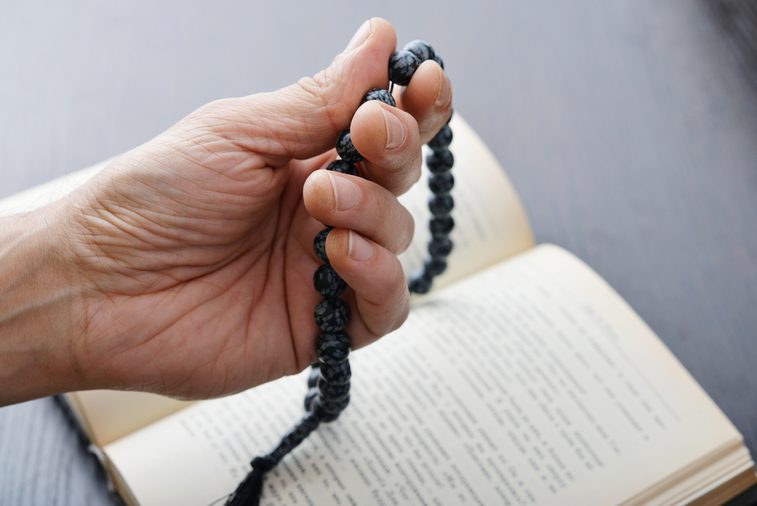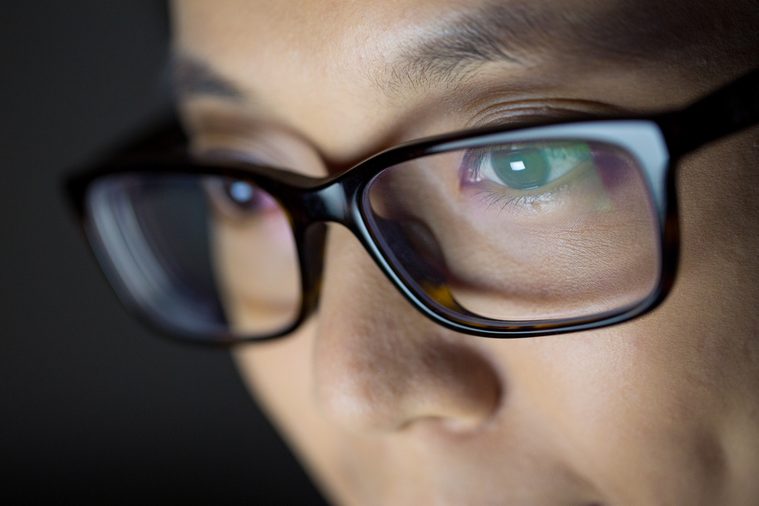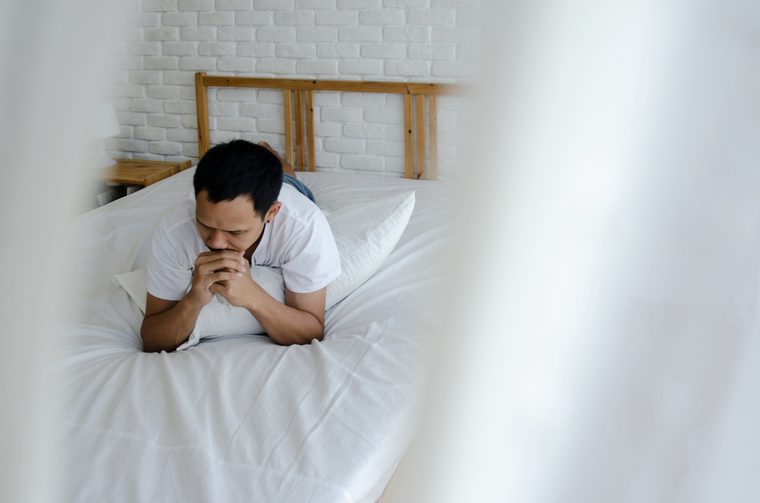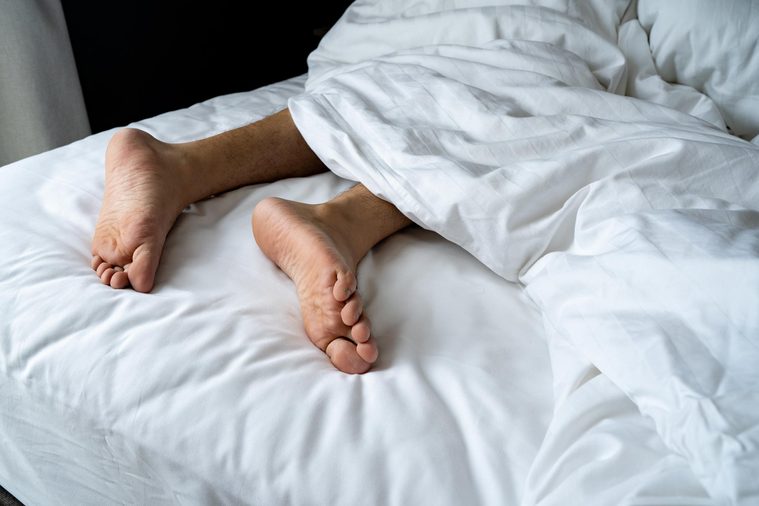
What is sex addiction?
The World Health Organization (WHO) includes compulsive sexual behavior disorder on its list of mental health disorders on the International Classification of Disease (ICD-11). Compulsive sexual behavior, according to the WHO, is an inability to control intense sexual urges to the point of obsession, leading to negative consequences at work or school or in relationships, as well as loss of interest in other activities and declining physical health. “Sex addicts are destroying their marriages, have lost jobs or created financial messes in their lives due to their compulsive behaviors,” says Alexandra Katehakis, Ph.D., clinical director of Center for Healthy Sex in Los Angeles and author of numerous books including Mirror of Intimacy: Daily Reflections on Emotional and Erotic Intelligence. And that all happens despite often getting little or no pleasure or satisfaction from the repeated sexual behaviors they’re engaging in.
Get The Healthy @Reader’s Digest newsletter

When is it not sex addiction?
According to the WHO, people must suffer from the disorder for at least six months and experience substantial distress as a result of their addiction before being diagnosed, the report adds. “The exclusions here are important,” adds David Ley, Ph.D., a clinical psychologist in practice in Albuquerque, New Mexico, and author of The Myth of Sex Addiction. The six-month duration would likely exclude those men who only identify as sex addicts when they’ve gotten caught and gotten in trouble.” It may not be a coincidence that this move comes after the WHO declared compulsive video-game playing a disorder. “Sexual fantasy and activity is used to numb out and avoid stress, loneliness, boredom, sadness, and other uncomfortable feelings,” says Robert Weiss, LCSW, CEO of Seeking Integrity LLC and author of numerous books about sexual addiction/compulsivity, including Sex Addiction 101. He also hosts a sex- and intimacy-focused podcast, Sex, Love, and Addiction 101. “Sex isn’t being used to feel more; it’s being used to feel less.”

Controversy over the label
The label “sex addict” is controversial in the sex therapist community. One camp doubts that sex can be addictive and feels the label is potentially shaming. It’s also true that culture, religion and upbringing can shape views on sex, so for example, people raised in religious homes may have been taught that sex should make them feel guilty and ashamed, and as a result, they label themselves as sex addicts. Or they’ve been told they have an overly high libido or watch too much porn, so they’re diagnosed as a sex addict by someone untrained in sexual medicine. “The more shame is associated with sex, the more likely the person will act out on the behavior,” says Angela Skurtu, M.Ed., LMFT, who conducts the About Sex Podcast with Angela Skurtu and is the author of Helping Couples Overcome Infidelity.

How the label can be abused
People may also seize the label for their own purposes. “Part of the problem with the field of sex addiction now is that many people have used the label of ‘sex addict’ to excuse their behavior, repetitive infidelity, and inability to acknowledge their dishonesty in a marriage,” says Tammy Nelson, PhD, a sex therapist, couples therapist and author of Getting the Sex You Want and The New Monogamy. “Sex addiction has become an umbrella diagnosis that may have allowed public figures to seek treatment and apologize publicly, using sex addiction as an excuse for what would otherwise be a lack of integrity.”

Why sex addiction may not be an addiction at all
Some experts feel that sex is a behavior, not a substance that can manipulate your brain like alcohol and drugs. Sex addiction also isn’t yet part of the Diagnostic Statistical Manual for Psychiatric Disorders (DSM-5), which is the bible of mental health conditions. And that means it isn’t a diagnosable mental health condition. Though the WHO may classify “compulsive sexual behavior” in ICD-11, the group isn’t quite calling it a “sex addiction.” So, this group of experts doesn’t feel it’s a true addiction. “The argument is that there isn’t enough research to corroborate it as an addiction,” says Dr. Katehakis.
23 Everyday Things You Didn’t Know You Could Get Addicted To

Other disorders may be to blame
Many people who seek sex addiction treatment are often struggling with underlying mental health conditions—depression, anxiety, bipolar disorder, and OCD. For example, those who are depressed may kill time masturbating and watching porn. That contributes to their low mood, so what they need is to treat their depression rather than sex addiction. “Think about depression,” says Dr. Skurtu. “Essentially people feel numb or dead inside. It’s crippling and overwhelming. A natural response is to avoid this feeling by getting lost in TV, video games, porn, sex, drugs and/or alcohol. People seek porn or sex to feel alive again.” In fact, a study found that nearly three-quarters of men seeking sex addiction treatment had at least one other psychiatric diagnosis.

Research casts doubt
Studies suggest that self-reported sex addicts don’t show any different brain activity than those with high libidos. In a study published in Biological Psychology, researchers at the University of California, Los Angeles, used EEG to measure brain activity in men and women, some of whom reported having problems controlling their online pornography viewing. After participants viewed a set of photos, some of which were sexual, researchers found that the pattern of brain responses didn’t match what would normally be seen with other vices, including tobacco, cocaine, and gambling, showing that sex doesn’t activate the brain the same way known addictions do.

Why sex addiction could still be real
On the other end of the spectrum, some sex addiction therapists feel that sex and its accompanying behaviors are as destructive and addictive as any drug. A study from the University of Cambridge published in PLOS ONE showed that in participants with compulsive sexual behavior who watched porn videos, three parts of the brain lit up—the same brain regions that are activated in drug addicts when they’re shown images of drugs. “We’re naturally drawn to activities that give us a better high, like sex,” says Skurtu. “When we’re depressed, we’re even more drawn to behaviors and chemicals that make us high.” Skurtu is a sex therapist who believes that sex addiction is often a much broader issue associated with other diagnoses like depression or OCD. “If we shame people for the behavior, they’re more likely to act out on it. The more we normalize the experience of ‘getting high,’ the easier it is for people to choose healthier options for getting high,” Skurtu says.
It’s important to remember that sex itself is not the problem. “Like most addictions, it’s the abuse of the substance—like alcohol or chocolate cake, or the behavior, like exercise, gambling, or sex— that’s the problem,” says Dr. Katehakis. Helping people understand that the brain, nervous system, and how your culture influences who you are and what you do helps people feel less broken, she says. “When people understand that it’s a problem that they can change, it makes them less ashamed and more relieved.”
How common is sex addiction?
The rich and famous aren’t the only ones who are being treated for this disorder. It’s estimated that sex addiction, as defined by “clinically relevant levels of distress and/or impairment associated with difficulty controlling sexual feelings, urges, and behaviors” may affect up to 10% of the general U.S. population, according to the Cleveland Clinic. “It’s been a while since we’ve attempted to quantify the number of sex addicts,” Weiss says. “Because so many people are either undiagnosed or quietly seeking recovery, it’s almost impossible to get an accurate estimate.”
20 Secrets Addiction Counselors Desperately Want You to Know

Sex addiction rates in men and women
The majority of sex addicts are men, but don’t read too much into that stat. “Women are less likely to report it, hence lowering their actual reported numbers,” says Youssef Hassoun, MD, a psychiatrist, and associate medical director at South Oaks Hospital in Amityville, New York. Anecdotally, Dr. Katehakis says she sees about a 70 to 30% split at her center when it comes to men versus women who come in for treatment, and yet the hospital’s female sex and love addicts’ workshop is always sold out. “Women are definitely seeking help, but they don’t present in the same way as males,” says Dr. Katehakis. “All of them have trauma from childhood that’s masked and managed by seeking sex and love in unhealthy ways.”

Red flags that you could have a sex addiction
Weiss says that red flags include multiple failed attempts to quit or cut back, an emotional and physical distancing from loved ones, a loss of interest in all things unrelated to the addiction, emotional instability, and a variety of consequences—relationship trouble, issues at work or in school, depression, anxiety, loss of interest in other activities, declining physical health, and financial woes. “People know when they’re in distress and when their lives aren’t working for them,” says Dr. Katehakis. “It’s usually at that point that they figure out that something’s wrong, and that they need help.”
12 Ways to Help Someone with Depression, According to Psychologists
Treatment for sex addiction
Curing sex addiction doesn’t mean banishing sex. “Recovery from sex addiction is about recovering, or creating for the first time a sense of sexuality that is arousing, joyous, and fun,” says Dr. Katehakis. “It’s never about not having enjoyable sex again.”
Since sex addiction is such a controversial concept, where you get treatment can impact how you’re treated. Some people benefit from 12-step programs like the one by Alcoholic Anonymous, or stints at rehab facilities, or treatment using journaling, exercise, animal therapies, prayer, or free online services. “Sex therapists normalize sex and sexual thoughts,” says Skurtu. “Once they realize it’s OK to allow thoughts to happen naturally, then they can make a more conscious choice about what and whether they want to indulge in the sexual thought or not.” Therapy will also help them achieve healthier highs—by meeting exercise goals, developing self-confidence, or feeling valued as a person, says Skurtu. “Getting them in a therapeutic relationship is a good start—to have them talk about the issue and support them in their efforts to want to stop,” says Dr. Hassoun.

How to find help
Unfortunately, many people don’t seek help; they just try to deal with it on their own. “Most of us don’t want to admit that we’re sick when we have a physical illness much less a mental issue,” says Dr. Katehakis. “People generally have to be in a lot of distress to ask for help.” If you’re seeking help, find a sex therapist through the American Association of Sexuality Educators, Counselors and Therapists, or visit SexandRelationshipHealing.com, which has up-to-the-minute information, resources, podcasts, and interactive webinars. In addition to information and resources, the Center for Healthy Sex offers intensive out-patient programs for men, women, and partners of sex addicts.
For more wellness updates, follow The Healthy on Facebook, Instagram, and Twitter. Keep reading:


